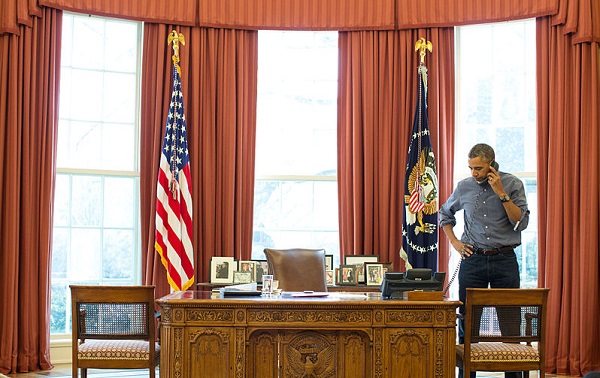In 1933, US President Franklin D. Roosevelt recognized the Soviet Union after some 15 years of severed relations following the Bolshevik Revolution. On a day in December of that year, a train was passing through Poland carrying the first American diplomats dispatched to Moscow. Amongst their number was a 29 year-old Foreign Service Officer, later to become famous as a diplomat and scholar, George Kennan. Though he was already deemed a government expert on Russia, the train provided Kennan’s first actual exposure to the Soviet Union. As he listened to his group’s escort, Russian Foreign Minister Maxim Litvinov, reminisce about growing up in a village the train was passing close by, and his dreams of becoming a librarian, the Princeton-educated Kennan was astonished: “We suddenly realized, or at least I did, that these people we were dealing with were human beings like ourselves, that they had been born somewhere, that they had their childhood ambitions as we had. It seemed for a brief moment we could break through and embrace these people.”
It hasn’t happened yet.
One would think that the absence in Russia of communism, of socialism, of the basic threat or challenge to the capitalist system, would be sufficient to write finis to the 70-year Cold War mentality. But the United States is virtually as hostile to 21st-century Russia as it was to 20th-century Soviet Union, surrounding Moscow with military bases, missile sites, and NATO members. Why should that be? Ideology is no longer a factor. But power remains one, specifically America’s perpetual lust for world hegemony. Russia is the only nation that (a) is a military powerhouse, and (b) doesn’t believe that the United States has a god-given-American-exceptionalism right to rule the world, and says so. By these criteria, China might qualify as a poor second. But there are no others.
Washington pretends that it doesn’t understand why Moscow should be upset by Western military encroachment, but it has no such problem when roles are reversed. Secretary of State John Kerry recently stated that Russian troops poised near eastern Ukraine are “creating a climate of fear and intimidation in Ukraine” and raising questions about Russia’s next moves and its commitment to diplomacy.
NATO – ever in need of finding a raison d’être – has now issued a declaration of [cold] war, which reads in part:
“NATO foreign ministers on Tuesday [April 1, 2014] reaffirmed their commitment to enhance the Alliance’s collective defence, agreed to further support Ukraine and to suspend NATO’s practical cooperation with Russia. ‘NATO’s greatest responsibility is to protect and defend our territory and our people. And make no mistake, this is what we will do,’ NATO Secretary General Anders Fogh Rasmussen said. … Ministers directed Allied military authorities to develop additional measures to strengthen collective defence and deterrence against any threat of aggression against the Alliance, Mr. Fogh Rasmussen said. ‘We will make sure we have updated military plans, enhanced exercises and appropriate deployments,’ he said. NATO has already reinforced its presence on the eastern border of the Alliance, including surveillance patrols over Poland and Romania and increased numbers of fighter aircraft allocated to the NATO air policing mission in the Baltic States. … NATO Foreign Ministers also agreed to suspend all of NATO’s practical cooperation with Russia.”
Does anyone recall what NATO said in 2003 when the United States bombed and invaded Iraq with “shock and awe”, compared to the Russians now not firing a single known shot at anyone? And neither Russia nor Ukraine is even a member of NATO. Does NATO have a word to say about the right-wing coup in Ukraine, openly supported by the United States, overthrowing the elected government? Did the hypocrisy get any worse during the Cold War? Imagine that NATO had not been created in 1949. Imagine that it has never existed. What reason could one give today for its creation? Other than to provide a multi-national cover for Washington’s interventions.
One of the main differences between now and the Cold War period is that Americans at home are (not yet) persecuted or prosecuted for supporting Russia or things Russian.
But don’t worry, folks, there won’t be a big US-Russian war. For the same reason there wasn’t one during the Cold War. The United States doesn’t pick on any country which can defend itself.







